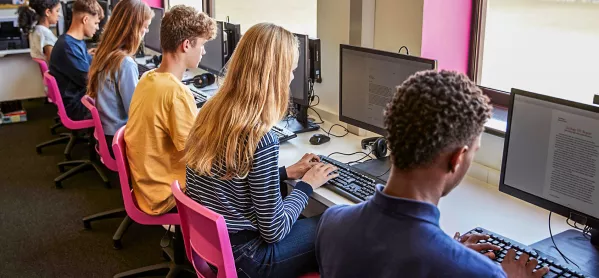Schools need tech investment to avoid online exam ‘divide’

The government must invest in technology infrastructure for schools to ensure online exams do not create a “new digital divide”, exam board leaders have warned.
Speaking at the Westminster Education Forum conference on the future of assessment, Mary Curnock Cook, chair of Pearson, said digital assessment would not be possible unless the government “lay the foundations for these changes”.
It should do this “by rolling out plans for every student to have a device and every school or college to have fast reliable broadband and wi-fi”, she said.
“Because, without these, none of this much-needed modernisation of assessment can even start - at least not on an equitable basis.”
- OCR to launch first fully online GCSE in 2025
- GCSEs: AQA plans for digital exams from 2026
- GCSEs 2024: Heads warning over mock exams
Exam boards AQA, OCR and Pearson have all laid out proposals to begin delivering some of their GCSEs digitally over the next few years.
But OCR chief executive Jill Duffy told the conference today that some schools “won’t have strong digital infrastructure in place because of underinvestment, and that’s unacceptable. They need more support”.
Ms Duffy echoed comments she made in an article published on Tes today, where she wrote that if there was no action on widening digital access then “we risk a new digital divide”.
She told the conference: “OCR is calling for more government support for schools to implement adequate digital infrastructure - schools and teachers need support right now.
“For every student to benefit from world-class digital infrastructure, this means investment, training and guidance to realise this opportunity and build a fairer system.”
She added that the exam board is “investing in new training, support and guidance for teachers to facilitate digital exams and classroom preparation”.
Guidance for online exams
Tom Middlehurst, assessment specialist at the Association of School and College Leaders, has previously called for investment in digital infrastructure if online exams are going to be implemented.
Almost eight in 10 (79 per cent) of teachers surveyed by AQA - as part of their work on moving to digital exams - chose sufficient technological devices as the main thing they’d need to get students ready for online exams.
Ian Bauckham, former chair and soon-to-be chief regulator of Ofqual, said he did not “envisage a world where students sit exams solely on screen”.
Meanwhile, less than a third (28 per cent) of teachers agreed that on-screen examinations at GCSE and A level would be more manageable for schools and colleges than existing pen-and-paper examinations, while 51 per cent disagreed, according to a survey carried out by Ofqual earlier this year.
High-speed access for every school
Tom Thacker, chief education officer of digital learning platform Century Tech, said it would be important for exam boards to come up with guidance on what will be needed to ensure students have equitable access to online exams.
Also speaking at the online assessment conference today, Mr Thacker said he expects there will need to be specific guidance on issues - such as screen size and keyboard requirements - for summative exams to guard against the use of smaller screens such as phones.
He said: “I think the sooner exam boards publish what they think is needed [the better]. There absolutely should be parameters around that.”
In March 2022, then education secretary Nadhim Zahawi promised every school in England would have high-speed internet by 2025 from a £150 million fund, adding that the government was keen to explore digital assessment possibilities.
Technology standards
Ofqual also said in 2022 that it would research the greater use of technology in assessment and qualifications.
The digital and technology standards for schools set out broadband and wireless network standards, which says networks should be high-performance enough that the connection does not slow when many devices connect to it, and broadband should be full fibre.
OCR has announced that students can start studying for a fully online computer science GCSE from 2025, subject to Ofqual regulatory approval.
AQA are planning for students to take online components of Italian and Polish GCSEs exams from 2026.
The Department for Education has been contacted for comment.
Register with Tes and you can read two free articles every month plus you'll have access to our range of award-winning newsletters.
Keep reading with our special offer!
You’ve reached your limit of free articles this month.
- Unlimited access to all Tes magazine content
- Save your favourite articles and gift them to your colleagues
- Exclusive subscriber-only stories
- Over 200,000 archived articles
- Unlimited access to all Tes magazine content
- Save your favourite articles and gift them to your colleagues
- Exclusive subscriber-only stories
- Over 200,000 archived articles
topics in this article



